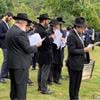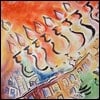When the young man entered the front doors of Bais Simchah on Shabbat morning, Rabbi Levi paused his Kaballah lesson and peered at the man. All the eyes of the small congregation also turned to study the stranger.
He was in his mid-twenties, well-built, of medium height, dark-skinned with intense brown eyes, wearing a t-shirt, slacks, sandals, and a black cap.
"Welcome!" Rabbi Levi called out.
The young man nodded, hesitated, and then walked tentatively to the long table where twenty people from the congregation were seated. There was an empty seat at the end of the table, farthest from the rabbi.
He did not question how he knew the young man was Israeli"Shev, b'vakashah, please sit," Rabbi Levi added with a smile. He had on his finest Shabbat suit made of dark, comfortable fabric and a freshly starched white shirt.
The young man nodded again, sat down, and looked around. He appeared uncomfortable because he was the youngest adult present. Everyone else ranged from the mid-thirties and upward.
"Why are you speaking Hebrew, Rabbi?" whispered Avi Fingerboard, the youthful eighty-two-year-old synagogue attendant who lied and said he was seventy-five. That was so his sixty-seven-year-old girlfriend, Sara Batya, who sat beside him in an expensive pastel dress, would not think of him as too old for her.
"Because he is Israeli," the rabbi whispered back.
"How can you tell?"
"It's his nose."
Avi turned around and stared at the young man's nose, and then looked back at the rabbi, puzzled.
"I don't get it. His nose looks like a regular nose," Avi whispered back.
Rabbi Levi winked at Avi, indicating he had made a joke, and after a long pause, Avi smiled back, indicating he got it.
He did not question how he knew the young man was Israeli; he just knew. It was also true that some sabras, native Israelis, emitted an intensity that Rabbi Levi was attuned to. Perhaps it was the air in Israel that made them intense, Rabbi Levi mused, or perhaps it was the Kohen gene in the rabbi's ancestry that made him aware of such a thing.
The rabbi continued with his talk about Chanukah, the kabbalistic meaning of the holiday, and the numerical value of the word "Maccabee." After another twenty minutes, he glanced at the clock on the wall, and began to wrap up his lecture. It was time to begin the Shabbat morning service.
"Don't forget to light the Menorah after havdalah tonight," Rabbi Levi reminded the congregation of Bais Simcha in Sunshine, Florida, a little town west of Miami.
The twenty-odd devotees of his congregation, who regularly attended Saturday services, stood and moved the tables and chairs around, facing their Torah resting in its fine wooden ark, which, in turn, faced Jerusalem.
Perhaps it was the air in Israel that made them intense, Rabbi Levi musedThe young stranger approached Rabbi Levi amidst the commotion, and tapped him on the shoulder.
"Rabbi, would you mind if …"
Before he could finish the sentence, Avi Fingerboard steered the rabbi away by the arm while pointing to the clock, letting him know that now was time to start the prayer service because Avi had to be home to take his medicine by one o'clock, and he liked to spend at least an hour by the synagogue-hosted Shabbat meal. Rabbi Levi sighed, opened his prayer-book, and began the Shabbat morning service.
When the rabbi came to the Kaddish portion, the prayer honoring those who have passed from this world, he turned to face the group of twelve men.
"Is there anyone who wants to say Kaddish?"
The young stranger stood up.
Rabbi Levi nodded to him, and the young man began saying the prayer in perfect Hebrew. There were several places where the congregation said "Amen" and one place where they repeated a verse. When the young man reached the last verse, he stopped midway, heaved a heavy sigh, and shook his head. He tried to repeat the verse, but he could not. He sighed again, closed his prayer book, and walked out of Bais Simchah, his eyes avoiding the stares of the congregation.
"Avi, please take over from here," Rabbi Levi said, pushing over the special prayer-book with the extra-large print for the eighty-two-year-old man. Then the rabbi walked quickly out of the synagogue, following the young stranger, while the members once again followed with their stares.
"Let's continue!" Avi ordered over the mumbled protests of the others. He continued on with the service, much louder than Rabbi Levi, making many more mistakes which were gleefully corrected by some of the members of the congregation.
Outside, Rabbi Levi looked around and saw the young man sitting on a bench under Bais Simcha's large oak tree, staring up at the sky. Rabbi Levi walked up to him.
"Would you mind if I joined you?" the rabbi asked in Hebrew.
The young man stared over at the rabbi, and after a very long, thoughtful pause, he said, "No, I don't mind, Rabbi, but I think it would better if we spoke English. My Middle-Eastern accent is easier to understand in English than your American accent is in Hebrew."
He had a strong grip and a calloused hand, in contrast to the rabbi'sRabbi Levi smiled, stroked his long beard, and nodded in agreement. He sat down, placed his hands in his lap, and looked around. A squirrel, one of the few that inhabited the large trees in the back, was gathering acorns for the winter, even though it was still over eighty degrees. Such is winter in South Florida in early December.
"I don't believe I have seen you here before. What is your name?" Rabbi Levi asked.
"I am called Or. Or Amarli." The young man extended his hand, and Rabbi Levi shook it. He had a strong grip and a calloused hand, in contrast to the rabbi's, which was softer and accustomed to turning pages rather than manual labor.
"I am Rabbi Yaakov Levi, but you can call me Yankee."
"Yankee?"
"It is my nickname, and also the name of an American baseball team from New York. It makes the members of my congregation smile when they say it, and I like seeing them smile."
Or nodded, but did not say anything further.
"Who were you saying Kaddish for?" the Rabbi asked.
"It is not important."
Or turned his head away and looked off in the distance once again.
"Not important?" Rabbi Levi asked, his eyebrows raised.
When Or looked back over at Rabbi Levi, his eyes welled up with tears.
"Perhaps it would be better to say … that I would rather not say ... Yankee … no … Rabbi … I am sorry but I cannot call you Yankee. It does not make me smile to say it."
Rabbi Levi nodded.
"What brings you to our little town – business or pleasure?"
"I go to university in Miami, but I was invited to stay the weekend with a college friend who lives a few blocks from here. When I asked him if there was a synagogue nearby, this is the only one he could think of. He is not Jewish, so he did not join me."
Or's eyes once again filled up with tears"Do you regularly attend synagogue in Miami?"
"No. But then I do not regularly need to say Kaddish."
Or's eyes once again filled up with tears.
"Do you still feel the need?" the rabbi asked.
Or nodded his head.
"Perhaps then we should go back inside. What do you think, Or?"
"Yes, Rabbi. I would like that very much," he said softly.
Rabbi Levi put his hand on Or's shoulder, like a father comforting a son, and they walked back into the synagogue together. Or picked up a prayer-book and prayed quietly in the back, while Rabbi Levi stood next to Avi at the dais until Avi finished a Psalm and then let the Rabbi resume the service.
When it was time to read the Torah, Rabbi Levi called up Or for one of the portions. Or insisted on reading his portion of the Torah himself and made only one mistake, which was impressive considering he had not prepared. After the Torah reading, Rabbi Levi gave a short sermon on Chanukah. Or rose and said Kaddish three more times before the service concluded.
"Everyone is invited to a special meal today in honor of Chanukah," Rabbi Levi called out, "and in honor of our guest, Or Amarli, from Israel." He turned to Or, and said, "Or, we would be honored if you would stay and join us."
Or nodded his head.
The tables and chairs were once again moved around, forming a U-shape. Everyone pitched in. Some of the women, including the rabbi's wife, Rebecca Levi, worked rapidly in the kitchen preparing the meal, while the men set out disposable tablecloths, paper plates, plastic utensils, and paper napkins. Nobody liked to wash dishes and silverware on Shabbat for a party of twenty or more.
When the meal was set and everything was ready, Rabbi Levi raised a full cup of wine and said the kiddush prayer. Everyone had a sip of wine, and went to wash for challah. Rabbi Levi waited patiently for everyone to finish washing, while sitting with his family, humming a Chassidic melody. When all had completed the ritual, he said the blessing, cut the challah, dipped the slices in a little salt, took a bite and passed around pieces of the delicious homemade, sweet bread.
"So, nu, Mr. Or Amarli, I don't mean to be a Mr. Busybody, but who were you saying Kaddish for?""So, nu, Mr. Or Amarli, I don't mean to be a Mr. Busybody, but who were you saying Kaddish for?" Avi Fingerboard asked, while still munching on his challah. Sara Batya whispered loudly that Avi should finish chewing before speaking.
"My savta, my grandmother," Or replied.
"I am so sorry," Rebecca Levi said, her voice full of genuine sympathy. "I still remember when I lost my Bubby. She was a very special person to me. When did your grandmother pass?"
"Three days ago."
"Did she pass here, in America?"
"No, in our little town in Israel, near Zichron Yakov."
"Did you go to the funeral?" Rebecca asked.
Or grew silent once again and turned away. He covered his face with his hands and began sobbing.
"I'm so sorry, Or," Rebecca Levi whispered. "I did not mean to make you feel worse than you must already feel. Please forgive me."
The rebbetzin looked at her husband who stood up and walked up to Or and placed his hand on the young man's shoulder.
"It will be all right," the Rabbi said soothingly.
Or turned around as tears dripped from his big brown eyes, eyes that changed from intensely bright to wet and luminescent. He did not look like he was ashamed to be crying in front of so many he did not know.
"I could not feel worse than I already feel, Rebbetzin," Or explained. "When I spoke to her last, she was in the hospital, but she said, 'I'm fine, dear. I'm fine. It's just a routine check-up. Take your exams and when you are finished, come home for Chanukah and we will light the candles together.'"
Or looked down and reached for a napkin to wipe his eyes.
"I have been lighting the candles of Chanukah with my Savta since I have been able to stand and reach the menorah."
Or wiped his face and then continued.
"She said she was fine … I said, 'Savta, are you sure?' and she said, 'Of course I am sure. You finish the semester and I will be waiting for you' … She promised me she would be waiting for me..."
With a shaking hand, Avi Fingerboard handed Or his napkin, since Or had drenched his with tears. Avi then thought of his own savta and when he started crying, he looked around for someone else's napkin. He saw Sara Batya's was untouched, but when he reached for it, she grabbed it away at the last second and wiped her own eyes. Avi used his shirt sleeve, when he thought no one was looking.
Avi Fingerboard handed Or his napkin, since Or had drenched his with tearsThere was a writer among the congregation, a poor storywriter of little fame and small success, but he loved to hear stories, and the real ones were best. He, too, started crying – he could not help it. The only thing he could think of to honor the moment was to say, "Or, please tell us a story about your savta, so that we may know her too, and know how precious she was to you."
Rabbi Levi was sure, absolutely positive, that Or would not tell a story in public, since a short while before, Or would not tell him even privately for whom he was saying Kaddish. Rabbi Levi thought, "If Or would not tell such a thing to the most trusted member of the congregation, the one whom everyone told their special story… but if they should tell such a story… before they could tell it… they swear me to secrecy and…"
Or continued, interrupting the Rabbi's thoughts, causing the good rabbi to remind himself that perhaps it was time for his humility check.
"A story of my savta? There are so many … there was a time I was in the army … yes … and my commanding officer was giving me a rough time. He demanded I shoot better and run faster than the five men that were under my command. He made me stay on base when the others had weekend passes, and practice firing at targets until my ears grew deaf, and then run until my feet were raw and achy. I told this to Savta while we were in her kitchen. My savta… she just listened, and stirred her chicken soup. You know, I can still smell her chicken soup … it was my favorite thing in the whole, wide world when I came home from the army … I was not home until I had her soup."
Or dabbed at his eyes, and then continued.
"Well, this officer reminded me of my father, whom I had not spoken to for almost a year because of the rough time he had given me in high school. Everything I did was not good enough for him. If I got a B+, I should have gotten an A. If I got an A, I should have gotten an A+. If I scored one goal in soccer, why didn't I score two?"
Or looked around and there were others in the congregation nodding their heads. They also understood what it was like to have a demanding parent.
"Savta handed me a huge bowl, and I drank it noisily, like only a man on leave from the army can. She told me to listen and be quiet. She said, 'Or, my heart, my light, it is my fault. You must not blame your father, you should blame me. I raised my son, your father, your Abba, to be strong, because only the strong in my family got out of Austria alive. I lost three brothers and two sisters … my mother and father …and my mother's mother, my own savta … to the Nazis. The others did not move fast enough to escape, like your grandfather and me.'"
"Or, my heart, my light, it is my fault. You must not blame your father"Or stopped because he was sobbing so hard he could barely breathe. When he gathered himself, he continued, "And each Chanukah, from that day forward, Savta and I would light a candle for each of those that she lost, one on each night, for the family that I would never know, but whom I came to know and love because, each night of Chanukah, Savta would tell me a story … a new story … about each of them ... all eight … and they would come alive for me."
Or looked around and said to the Rebbetzin, "Who will tell me those stories now? Those people will die now without my Savta … like she will die … like she has died."
That is how Or Amaeli came to stay in Sunshine, Florida for the holiday of Chanukah. Each remaining night, he came to Bais Simcha, and after lighting the menorah, told the congregation a new story about his savta. Her name was Chaya, which means life, and she came to life for the people of Sunshine ... their tears, and Or's tears, brought her to life.
The storywriter wrote down this story, and thanked G‑d for allowing him to hear it, because it was a gift. The writer did not have such a story inside him, nor would he ever.
And as he wrote the words, the storywriter thought, this is what is so wonderful about being a Jew. Because when a Jew is a stranger, and he stops by a synagogue on Shabbat, and he opens his heart, and shares the love and pain in his heart, there are other Jews that will open their hearts to him and make him feel like family.
And then the congregation will remember, once again, that all Jews are one family.
Dedicated to A.R. and Savta Chaya







Join the Discussion